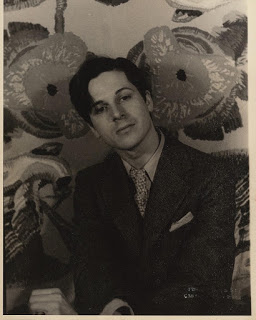

Partner Charles Boultenhouse
Queer Places:
George’s Bar, Bleecker St & 7th Ave S, New York, NY 10014
View Office, 1 E 53rd St, New York, NY 10022
15 Charles St, New York, NY 10014
 Harrison
Parker Tyler, better known as Parker Tyler (6 March 1904,
New
Orleans – June 1974,
New York City), was an American author, poet, and
film critic. Tyler had a relationship with underground filmmaker
Charles Boultenhouse from 1945 until his death. Their papers
are held by the New York Public Library.[1] Tyler wrote an homosexual novel, The Young and the Damned,
with
Charles Henri Ford
and they also edited a magazine coming out of Columbus, MS, called
''Blues: A Magazine of New Rhythms'', in 1929 and 1930.
Harrison
Parker Tyler, better known as Parker Tyler (6 March 1904,
New
Orleans – June 1974,
New York City), was an American author, poet, and
film critic. Tyler had a relationship with underground filmmaker
Charles Boultenhouse from 1945 until his death. Their papers
are held by the New York Public Library.[1] Tyler wrote an homosexual novel, The Young and the Damned,
with
Charles Henri Ford
and they also edited a magazine coming out of Columbus, MS, called
''Blues: A Magazine of New Rhythms'', in 1929 and 1930.
Parker Tyler descended from two Presidents, but the family was very poor. Parker never went to school and left home early, shifting for himself in New York. He was self-educated through omnivorous reading. Tyler ahd his close friend Charles Henri Ford arrived in New York from Columbus, MS, in the early 1930s, but Ford moved on to Paris, and it was after his return from Europe that the two of them decided to further collaborate on a new magazine and book. Except for his early childhood, Parker Tyler never lived too far from Sheridan Square; most of his close friends were Villagers, unconventional, radical, hysterically intelligent. He wore ascots or flowing cravats; his wavy black hair was long; his velvet or corduroy jackets somehow stamped upon him everyone's notion of romantic poet. He retained a slight Southern accent. His speech was decorous as only that of a gently bred person from Columbus, MS, can be decorous.
He wrote The Young and Evil (Paris: Obelisk Press, 1933) with Charles Henri Ford, an energetically experimental novel with obvious debts to fellow Villager Djuna Barnes, and also to Gertrude Stein.
In 1940, Charles Henri Ford and Parker Tyler collaborated again on the magazine ''View'' devoted to avant-garde and surrealist art. It "took full advantage of the European Surrealists roosting in New York during the war" to establish New York as a center of surrealism. The magazine was published quarterly, as finances permitted, until 1947. It attracted contributions from artists such as Pavel Tchelitchew, Yves Tanguy, Max Ernst, André Masson, Pablo Picasso, Henry Miller, Paul Klee, Albert Camus, Lawrence Durrell, Georgia O'Keeffe, Man Ray, Jorge Luis Borges, Joan Miró, Alexander Calder, Marc Chagall, Jean Genet, René Magritte, Jean Dubuffet, and Edouard Roditi. It printed the work of Max Ernst, Man Ray and Isamu Noguchi as its cover art.[11] In the 1940s, View Editions, the publishing arm of the quarterly, published the first monograph on Marcel Duchamp and a collection of André Breton's poems in a bi-lingual edition, ''Young Cherry Trees Secured Against Hares'' (1946).[12]
Once Tennessee Williams paid a visit to the office of View. They were all gathered in Charles Henri Ford's room, Ford sitting on his desk, a pile of books to be reviewed at his side, while in his hand he held a copy of Neverheless by Marianne Moore. "Who," he was asking, "should write a price about this?" Williams spoke up. "You know, Charlie," he said, "I think I could do a real nice review of Marianne Moore." Ford looked at him in astonishment and then in deepest Columbus, Mississippi, drawl he said, "Why, Tinn, can yew read?"
Alice De Lamar thought it would be nice if the 5th birthday of View was to be celebrated on her estate in Weston, CT. Charles Henri Ford thought it a wonderful notion, and since it was near Halloween, the celebration was a costume ball with Pavel Tchelitchew creating the decorations. Charles Henri Ford and Parker Tyler, taking their cue from Tchelitchew's beatiful drawings for Hide and Seek, were dressed as leaf children, with finishing touches by Tchelitchew.
Tyler and Ford co-edited the Surrealist magazine View until it folded in 1947. A writer for the journal Film Culture, Tyler is one of the few film critics to write extensively on experimental film and underground film. From its inception in 1946, Tyler was film commentator for the historic film society Cinema 16 founded by Amos Vogel. His Screening the Sexes: Homosexuality in the Movies (New York: Holt, Rinehart & Winston, 1972) was one of the first books about homosexuality and film, preceding Vito Russo's The Celluloid Closet (1981).[2]
He often wrote for the View, the Kenyon Review, Partisan Review, Evergreen Review, and the cineaste magazines Film Culture, and Film Quarterly. Some of his books are collections of his magazine work. He received a Longview Award for Poetry in 1958.
Tyler's books became popular—and some old titles reissued after being out-of-print for years—after Tyler was mentioned several times in the novel Myra Breckinridge (1968) by Gore Vidal.
Black Sparrow Press published his poetry, including a complete and corrected text of The Granite Butterfly, first published with Bern Porter, Berkeley, Calif., 1945, as The Will of Eros: Selected Poems 1930–1970 (Los Angeles: Black Sparrow Press, 1972)
My published books: